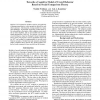Free Online Productivity Tools
i2Speak
i2Symbol
i2OCR
iTex2Img
iWeb2Print
iWeb2Shot
i2Type
iPdf2Split
iPdf2Merge
i2Bopomofo
i2Arabic
i2Style
i2Image
i2PDF
iLatex2Rtf
Sci2ools
101
click to vote
AAAI
2007
2007
Towards a Cognitive Model of Crowd Behavior Based on Social Comparison Theory
Models of crowd behavior facilitate analysis and prediction of human group behavior, where people are affected by each other’s presence. Unfortunately, existing models leave many open challenges. In particular, psychology models often offer only qualitative description, while computer science models are often simplistic, and are not reusable from one simulated phenomenon to the next. We propose a novel model of crowd behavior, based on Festinger’s Social Comparison Theory (SCT). We propose a concrete algorithmic framework for SCT, and evaluate its implementation in several crowd behavior scenarios. Results from task measures and human judges evaluation shows that the SCT model produces improved results compared to base models from the literature.
AAAI 2007 | Behavior Facilitate Analysis | Crowd Behavior | Crowd Behavior Scenarios | Intelligent Agents |
Related Content
| Added | 02 Oct 2010 |
| Updated | 02 Oct 2010 |
| Type | Conference |
| Year | 2007 |
| Where | AAAI |
| Authors | Natalie Fridman, Gal A. Kaminka |
Comments (0)

